 |
API - XOOPS 2.5.11 Beta 2
By monxoops.fr
|
 |
API - XOOPS 2.5.11 Beta 2
By monxoops.fr
|
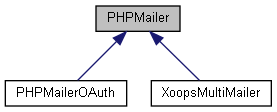
Public Member Functions | |
| __construct ($exceptions=null) | |
| __destruct () | |
| isHTML ($isHtml=true) | |
| isSMTP () | |
| isMail () | |
| isSendmail () | |
| isQmail () | |
| addAddress ($address, $name='') | |
| addCC ($address, $name='') | |
| addBCC ($address, $name='') | |
| addReplyTo ($address, $name='') | |
| parseAddresses ($addrstr, $useimap=true) | |
| setFrom ($address, $name='', $auto=true) | |
| getLastMessageID () | |
| idnSupported () | |
| punyencodeAddress ($address) | |
| send () | |
| preSend () | |
| postSend () | |
| getSMTPInstance () | |
| smtpConnect ($options=null) | |
| smtpClose () | |
| setLanguage ($langcode='en', $lang_path='') | |
| getTranslations () | |
| addrAppend ($type, $addr) | |
| addrFormat ($addr) | |
| wrapText ($message, $length, $qp_mode=false) | |
| utf8CharBoundary ($encodedText, $maxLength) | |
| setWordWrap () | |
| createHeader () | |
| getMailMIME () | |
| getSentMIMEMessage () | |
| createBody () | |
| headerLine ($name, $value) | |
| textLine ($value) | |
| addAttachment ($path, $name='', $encoding='base64', $type='', $disposition='attachment') | |
| getAttachments () | |
| encodeString ($str, $encoding='base64') | |
| encodeHeader ($str, $position='text') | |
| hasMultiBytes ($str) | |
| has8bitChars ($text) | |
| base64EncodeWrapMB ($str, $linebreak=null) | |
| encodeQP ($string, $line_max=76) | |
| encodeQPphp ( $string, $line_max=76, $space_conv=false) | |
| encodeQ ($str, $position='text') | |
| addStringAttachment ( $string, $filename, $encoding='base64', $type='', $disposition='attachment') | |
| addEmbeddedImage ($path, $cid, $name='', $encoding='base64', $type='', $disposition='inline') | |
| addStringEmbeddedImage ( $string, $cid, $name='', $encoding='base64', $type='', $disposition='inline') | |
| inlineImageExists () | |
| attachmentExists () | |
| alternativeExists () | |
| clearQueuedAddresses ($kind) | |
| clearAddresses () | |
| clearCCs () | |
| clearBCCs () | |
| clearReplyTos () | |
| clearAllRecipients () | |
| clearAttachments () | |
| clearCustomHeaders () | |
| isError () | |
| fixEOL ($str) | |
| addCustomHeader ($name, $value=null) | |
| getCustomHeaders () | |
| msgHTML ($message, $basedir='', $advanced=false) | |
| html2text ($html, $advanced=false) | |
| set ($name, $value='') | |
| secureHeader ($str) | |
| sign ($cert_filename, $key_filename, $key_pass, $extracerts_filename='') | |
| DKIM_QP ($txt) | |
| DKIM_Sign ($signHeader) | |
| DKIM_HeaderC ($signHeader) | |
| DKIM_BodyC ($body) | |
| DKIM_Add ($headers_line, $subject, $body) | |
| getToAddresses () | |
| getCcAddresses () | |
| getBccAddresses () | |
| getReplyToAddresses () | |
| getAllRecipientAddresses () | |
Static Public Member Functions | |
| static | validateAddress ($address, $patternselect=null) |
| static | rfcDate () |
| static | _mime_types ($ext='') |
| static | filenameToType ($filename) |
| static | mb_pathinfo ($path, $options=null) |
| static | normalizeBreaks ($text, $breaktype="\r\n") |
| static | hasLineLongerThanMax ($str) |
Static Public Attributes | |
| static | $validator = 'auto' |
Protected Member Functions | |
| edebug ($str) | |
| addOrEnqueueAnAddress ($kind, $address, $name) | |
| addAnAddress ($kind, $address, $name='') | |
| sendmailSend ($header, $body) | |
| mailSend ($header, $body) | |
| smtpSend ($header, $body) | |
| generateId () | |
| getBoundary ($boundary, $charSet, $contentType, $encoding) | |
| endBoundary ($boundary) | |
| setMessageType () | |
| attachAll ($disposition_type, $boundary) | |
| encodeFile ($path, $encoding='base64') | |
| setError ($msg) | |
| serverHostname () | |
| lang ($key) | |
| doCallback ($isSent, $to, $cc, $bcc, $subject, $body, $from) | |
Static Protected Member Functions | |
| static | isShellSafe ($string) |
| static | isPermittedPath ($path) |
Protected Attributes | |
| $MIMEBody = '' | |
| $MIMEHeader = '' | |
| $mailHeader = '' | |
| $smtp = null | |
| $to = array() | |
| $cc = array() | |
| $bcc = array() | |
| $ReplyTo = array() | |
| $all_recipients = array() | |
| $RecipientsQueue = array() | |
| $ReplyToQueue = array() | |
| $attachment = array() | |
| $CustomHeader = array() | |
| $lastMessageID = '' | |
| $message_type = '' | |
| $boundary = array() | |
| $language = array() | |
| $error_count = 0 | |
| $sign_cert_file = '' | |
| $sign_key_file = '' | |
| $sign_extracerts_file = '' | |
| $sign_key_pass = '' | |
| $exceptions = false | |
| $uniqueid = '' | |
| __construct | ( | $exceptions = null | ) |
Constructor.
| boolean | $exceptions | Should we throw external exceptions? |
| __destruct | ( | ) |
Destructor.

|
static |
Get the MIME type for a file extension.
| string | $ext | File extension @access public |
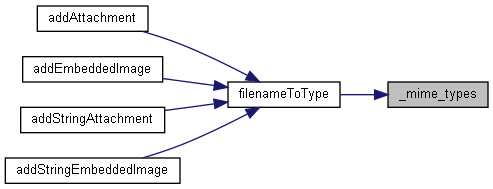
| addAddress | ( | $address, | |
$name = '' |
|||
| ) |
Add a "To" address.
| string | $address | The email address to send to |
| string | $name |
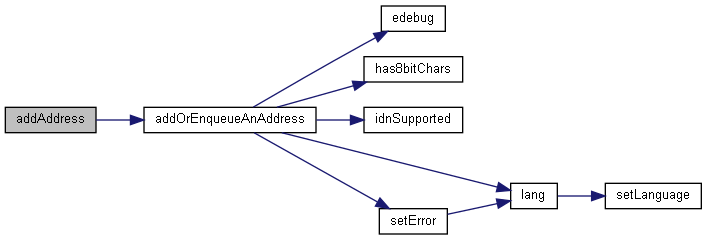
|
protected |
Add an address to one of the recipient arrays or to the ReplyTo array. Addresses that have been added already return false, but do not throw exceptions.
| string | $kind | One of 'to', 'cc', 'bcc', or 'ReplyTo' |
| string | $address | The email address to send, resp. to reply to |
| string | $name |
| phpmailerException |
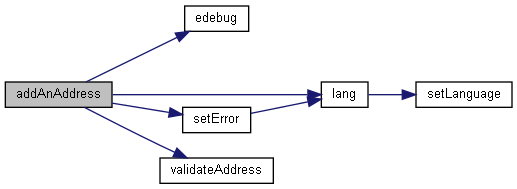
| addAttachment | ( | $path, | |
$name = '', |
|||
$encoding = 'base64', |
|||
$type = '', |
|||
$disposition = 'attachment' |
|||
| ) |
Add an attachment from a path on the filesystem. Never use a user-supplied path to a file! Returns false if the file could not be found or read. Explicitly does not support passing URLs; PHPMailer is not an HTTP client. If you need to do that, fetch the resource yourself and pass it in via a local file or string.
| string | $path | Path to the attachment. |
| string | $name | Overrides the attachment name. |
| string | $encoding | File encoding (see $Encoding). |
| string | $type | File extension (MIME) type. |
| string | $disposition | Disposition to use |
| phpmailerException |

| addBCC | ( | $address, | |
$name = '' |
|||
| ) |
Add a "BCC" address.
| string | $address | The email address to send to |
| string | $name |
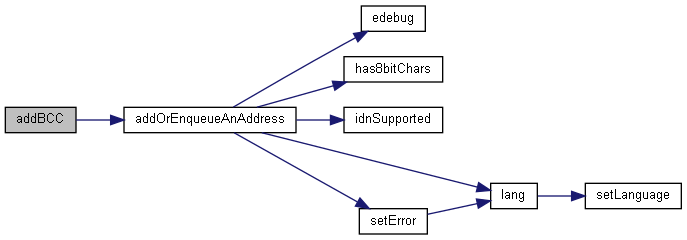
| addCC | ( | $address, | |
$name = '' |
|||
| ) |
Add a "CC" address.
| string | $address | The email address to send to |
| string | $name |
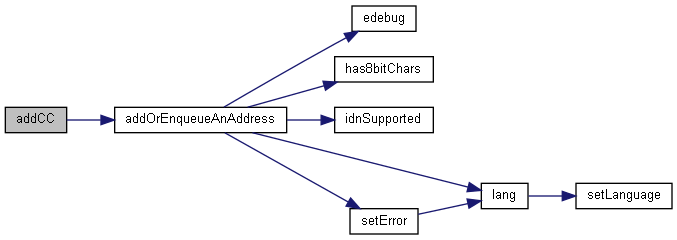
| addCustomHeader | ( | $name, | |
$value = null |
|||
| ) |
Add a custom header. $name value can be overloaded to contain both header name and value (name:value) @access public
| string | $name | Custom header name |
| string | $value | Header value |
| addEmbeddedImage | ( | $path, | |
| $cid, | |||
$name = '', |
|||
$encoding = 'base64', |
|||
$type = '', |
|||
$disposition = 'inline' |
|||
| ) |
Add an embedded (inline) attachment from a file. This can include images, sounds, and just about any other document type. These differ from 'regular' attachments in that they are intended to be displayed inline with the message, not just attached for download. This is used in HTML messages that embed the images the HTML refers to using the $cid value. Never use a user-supplied path to a file!
| string | $path | Path to the attachment. |
| string | $cid | Content ID of the attachment; Use this to reference the content when using an embedded image in HTML. |
| string | $name | Overrides the attachment name. |
| string | $encoding | File encoding (see $Encoding). |
| string | $type | File MIME type. |
| string | $disposition | Disposition to use |

|
protected |
Add an address to one of the recipient arrays or to the ReplyTo array. Because PHPMailer can't validate addresses with an IDN without knowing the PHPMailer::$CharSet (that can still be modified after calling this function), addition of such addresses is delayed until send(). Addresses that have been added already return false, but do not throw exceptions.
| string | $kind | One of 'to', 'cc', 'bcc', or 'ReplyTo' |
| string | $address | The email address to send, resp. to reply to |
| string | $name |
| phpmailerException |
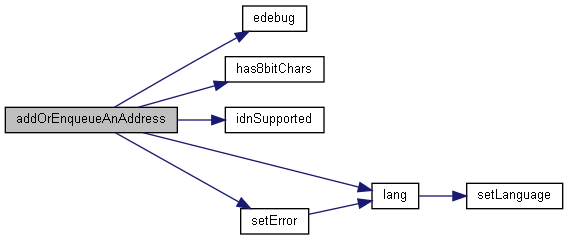
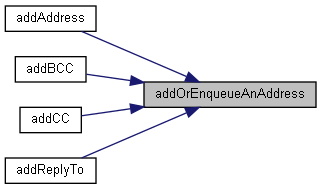
| addrAppend | ( | $type, | |
| $addr | |||
| ) |
Create recipient headers. @access public
| string | $type | |
| array | $addr | An array of recipient, where each recipient is a 2-element indexed array with element 0 containing an address and element 1 containing a name, like: array(array('joe@e.nosp@m.xamp.nosp@m.le.co.nosp@m.m', 'Joe User'), array('zoe@e.nosp@m.xamp.nosp@m.le.co.nosp@m.m', 'Zoe User')) |


| addReplyTo | ( | $address, | |
$name = '' |
|||
| ) |
Add a "Reply-To" address.
| string | $address | The email address to reply to |
| string | $name |
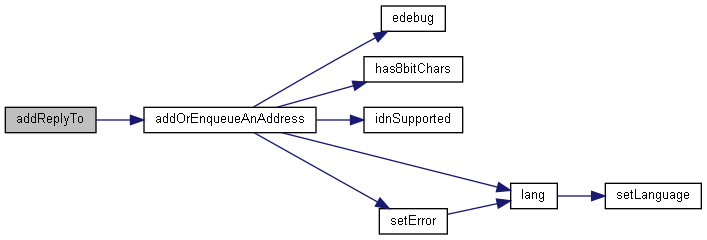
| addrFormat | ( | $addr | ) |
Format an address for use in a message header. @access public
| array | $addr | A 2-element indexed array, element 0 containing an address, element 1 containing a name like array('joe@e.nosp@m.xamp.nosp@m.le.co.nosp@m.m', 'Joe User') |
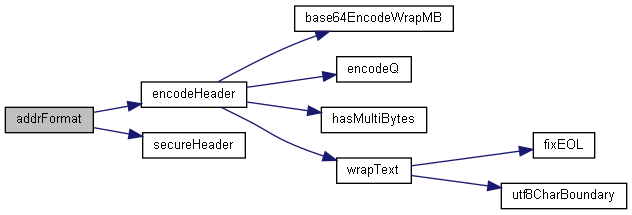

| addStringAttachment | ( | $string, | |
| $filename, | |||
$encoding = 'base64', |
|||
$type = '', |
|||
$disposition = 'attachment' |
|||
| ) |
Add a string or binary attachment (non-filesystem). This method can be used to attach ascii or binary data, such as a BLOB record from a database.
| string | $string | String attachment data. |
| string | $filename | Name of the attachment. |
| string | $encoding | File encoding (see $Encoding). |
| string | $type | File extension (MIME) type. |
| string | $disposition | Disposition to use |

| addStringEmbeddedImage | ( | $string, | |
| $cid, | |||
$name = '', |
|||
$encoding = 'base64', |
|||
$type = '', |
|||
$disposition = 'inline' |
|||
| ) |
Add an embedded stringified attachment. This can include images, sounds, and just about any other document type. Be sure to set the $type to an image type for images: JPEG images use 'image/jpeg', GIF uses 'image/gif', PNG uses 'image/png'.
| string | $string | The attachment binary data. |
| string | $cid | Content ID of the attachment; Use this to reference the content when using an embedded image in HTML. |
| string | $name | |
| string | $encoding | File encoding (see $Encoding). |
| string | $type | MIME type. |
| string | $disposition | Disposition to use |

| alternativeExists | ( | ) |
Check if this message has an alternative body set.

|
protected |
Attach all file, string, and binary attachments to the message. Returns an empty string on failure. @access protected
| string | $disposition_type | |
| string | $boundary |
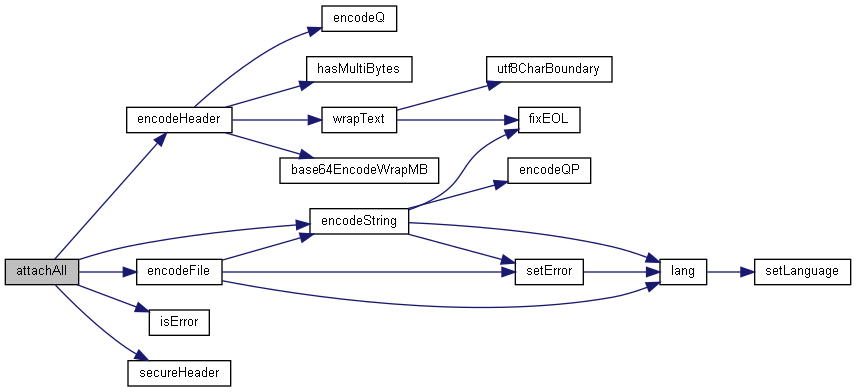

| attachmentExists | ( | ) |
Check if an attachment (non-inline) is present.

| base64EncodeWrapMB | ( | $str, | |
$linebreak = null |
|||
| ) |
Encode and wrap long multibyte strings for mail headers without breaking lines within a character. Adapted from a function by paravoid public string $str multi-byte text to wrap encode string $linebreak string to use as linefeed/end-of-line string

| clearAddresses | ( | ) |
Clear all To recipients.

| clearAllRecipients | ( | ) |
Clear all recipient types.
| clearAttachments | ( | ) |
Clear all filesystem, string, and binary attachments.
| clearBCCs | ( | ) |
Clear all BCC recipients.

| clearCCs | ( | ) |
Clear all CC recipients.

| clearCustomHeaders | ( | ) |
Clear all custom headers.
| clearQueuedAddresses | ( | $kind | ) |
Clear queued addresses of given kind. @access protected
| string | $kind | 'to', 'cc', or 'bcc' |
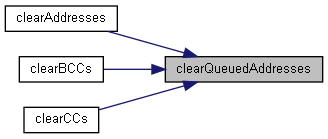
| clearReplyTos | ( | ) |
Clear all ReplyTo recipients.
| createBody | ( | ) |
Assemble the message body. Returns an empty string on failure. @access public
| phpmailerException |
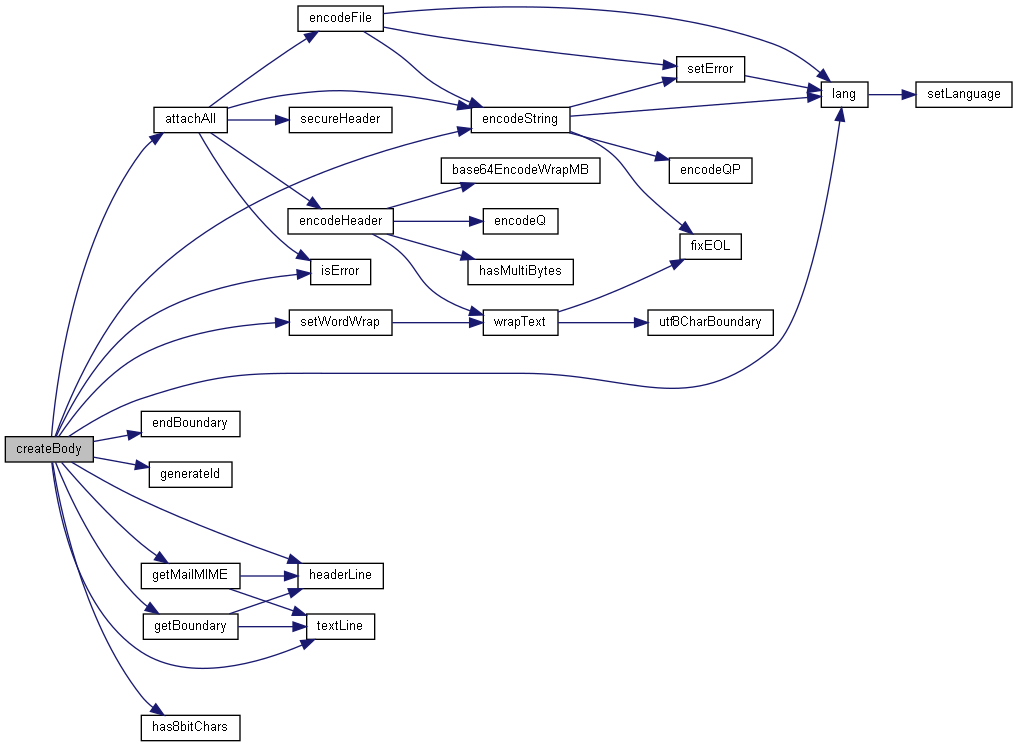

| createHeader | ( | ) |
Assemble message headers. @access public
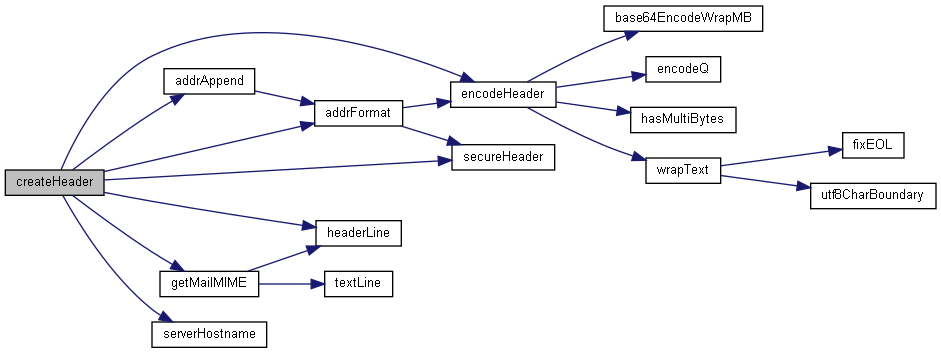

| DKIM_Add | ( | $headers_line, | |
| $subject, | |||
| $body | |||
| ) |
Create the DKIM header and body in a new message header. @access public
| string | $headers_line | Header lines |
| string | $subject | Subject |
| string | $body | Body |
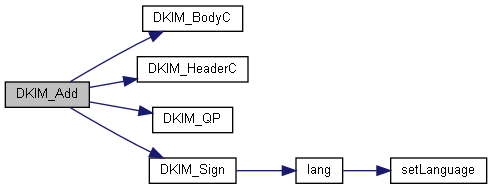

| DKIM_BodyC | ( | $body | ) |
Generate a DKIM canonicalization body. @access public
| string | $body | Message Body |

| DKIM_HeaderC | ( | $signHeader | ) |
Generate a DKIM canonicalization header. @access public
| string | $signHeader | Header |

| DKIM_QP | ( | $txt | ) |
Quoted-Printable-encode a DKIM header. @access public
| string | $txt |

| DKIM_Sign | ( | $signHeader | ) |
Generate a DKIM signature. @access public
| string | $signHeader |
| phpmailerException |


|
protected |
Perform a callback.
| boolean | $isSent | |
| array | $to | |
| array | $cc | |
| array | $bcc | |
| string | $subject | |
| string | $body | |
| string | $from |

|
protected |
Output debugging info via user-defined method. Only generates output if SMTP debug output is enabled (
| string | $str |
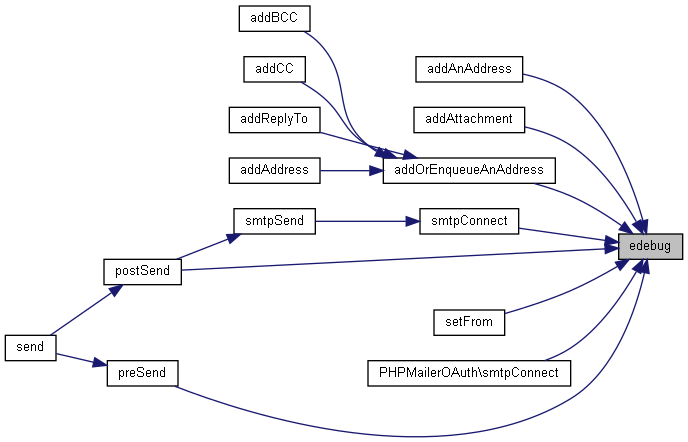
|
protected |
Encode a file attachment in requested format. Returns an empty string on failure.
| string | $path | The full path to the file |
| string | $encoding | The encoding to use; one of 'base64', '7bit', '8bit', 'binary', 'quoted-printable' |
| phpmailerException | @access protected |
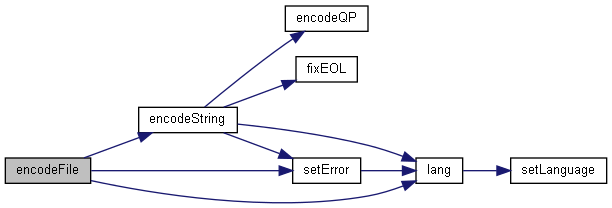

| encodeHeader | ( | $str, | |
$position = 'text' |
|||
| ) |
Encode a header string optimally. Picks shortest of Q, B, quoted-printable or none. @access public
| string | $str | |
| string | $position |
@noinspection PhpMissingBreakStatementInspection
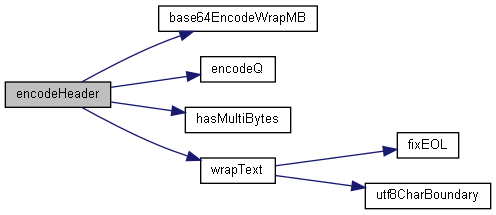
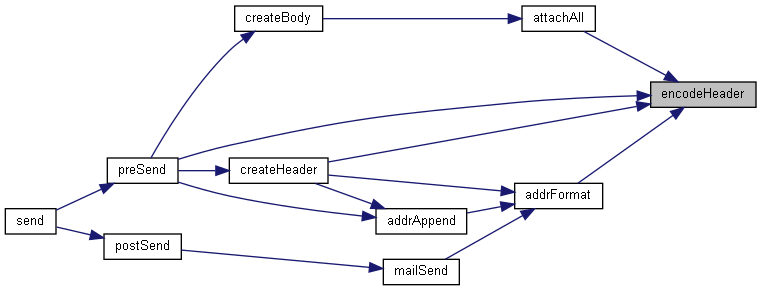
| encodeQ | ( | $str, | |
$position = 'text' |
|||
| ) |
Encode a string using Q encoding. string $str the text to encode string $position Where the text is going to be used, see the RFC for what that means public string
@noinspection PhpMissingBreakStatementInspection

| encodeQP | ( | $string, | |
$line_max = 76 |
|||
| ) |
Encode a string in quoted-printable format. According to RFC2045 section 6.7. @access public
| string | $string | The text to encode |
| integer | $line_max | Number of chars allowed on a line before wrapping |

| encodeQPphp | ( | $string, | |
$line_max = 76, |
|||
$space_conv = false |
|||
| ) |
Backward compatibility wrapper for an old QP encoding function that was removed.
| string | $string | |
| integer | $line_max | |
| boolean | $space_conv |
| $space_conv | @noinspection PhpUnusedParameterInspection |

| encodeString | ( | $str, | |
$encoding = 'base64' |
|||
| ) |
Encode a string in requested format. Returns an empty string on failure.
| string | $str | The text to encode |
| string | $encoding | The encoding to use; one of 'base64', '7bit', '8bit', 'binary', 'quoted-printable' @access public |
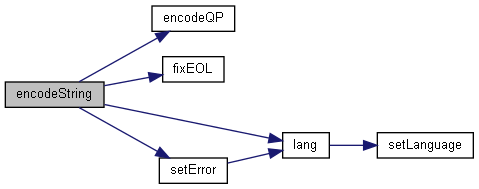

|
protected |
Return the end of a message boundary. @access protected
| string | $boundary |

|
static |
Map a file name to a MIME type. Defaults to 'application/octet-stream', i.e.. arbitrary binary data.
| string | $filename | A file name or full path, does not need to exist as a file |

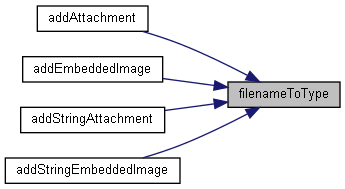
| fixEOL | ( | $str | ) |
Ensure consistent line endings in a string. Changes every end of line from CRLF, CR or LF to $this->LE. @access public
| string | $str | String to fixEOL |
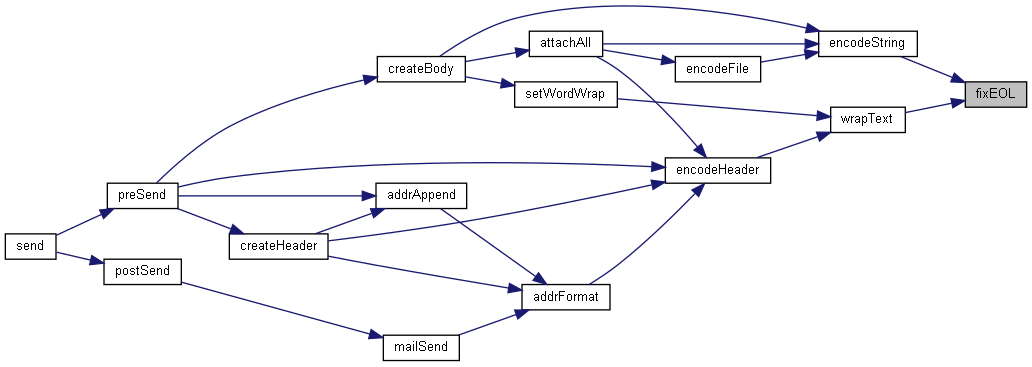
|
protected |
Create unique ID

| getAllRecipientAddresses | ( | ) |
Allows for public read access to 'all_recipients' property.
| getAttachments | ( | ) |
Return the array of attachments.
| getBccAddresses | ( | ) |
Allows for public read access to 'bcc' property.
|
protected |
Return the start of a message boundary. @access protected
| string | $boundary | |
| string | $charSet | |
| string | $contentType | |
| string | $encoding |


| getCcAddresses | ( | ) |
Allows for public read access to 'cc' property.
| getCustomHeaders | ( | ) |
Returns all custom headers.
| getLastMessageID | ( | ) |
Return the Message-ID header of the last email. Technically this is the value from the last time the headers were created, but it's also the message ID of the last sent message except in pathological cases.
| getMailMIME | ( | ) |
Get the message MIME type headers. @access public


| getReplyToAddresses | ( | ) |
Allows for public read access to 'ReplyTo' property.
| getSentMIMEMessage | ( | ) |
Returns the whole MIME message. Includes complete headers and body. Only valid post preSend().
| getSMTPInstance | ( | ) |
| getToAddresses | ( | ) |
Allows for public read access to 'to' property.
| getTranslations | ( | ) |
Get the array of strings for the current language.
| has8bitChars | ( | $text | ) |
Does a string contain any 8-bit chars (in any charset)?
| string | $text |
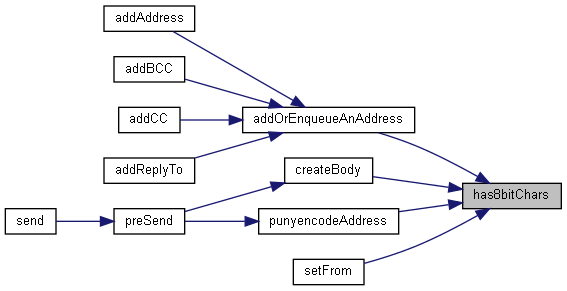
|
static |
Detect if a string contains a line longer than the maximum line length allowed.
| string | $str |
| hasMultiBytes | ( | $str | ) |
Check if a string contains multi-byte characters. @access public
| string | $str | multi-byte text to wrap encode |

| headerLine | ( | $name, | |
| $value | |||
| ) |
Format a header line. @access public
| string | $name | |
| string | $value |

| html2text | ( | $html, | |
$advanced = false |
|||
| ) |
Convert an HTML string into plain text. This is used by msgHTML(). Note - older versions of this function used a bundled advanced converter which was been removed for license reasons in #232. Example usage: // Use default conversion $plain = $mail->html2text($html); // Use your own custom converter $plain = $mail->html2text($html, function($html) { $converter = new MyHtml2text($html); return $converter->get_text(); });
| string | $html | The HTML text to convert |
| boolean | callable | $advanced | Any boolean value to use the internal converter, or provide your own callable for custom conversion. |
| idnSupported | ( | ) |
Tells whether IDNs (Internationalized Domain Names) are supported or not. This requires the "intl" and "mbstring" PHP extensions.
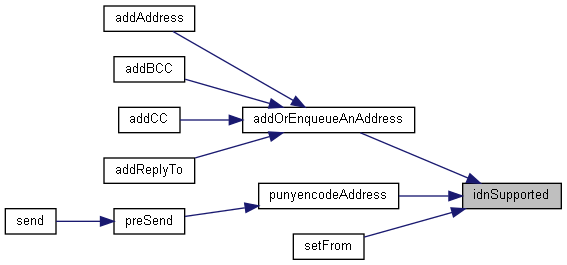
| inlineImageExists | ( | ) |
Check if an inline attachment is present. @access public

| isError | ( | ) |
Check if an error occurred. @access public

| isHTML | ( | $isHtml = true | ) |
Sets message type to HTML or plain.
| boolean | $isHtml | True for HTML mode. |
| isMail | ( | ) |
Send messages using PHP's mail() function.
|
staticprotected |
Check whether a file path is of a permitted type. Used to reject URLs and phar files from functions that access local file paths, such as addAttachment.
| string | $path | A relative or absolute path to a file. |
| isQmail | ( | ) |
Send messages using qmail.
| isSendmail | ( | ) |
Send messages using $Sendmail.
|
staticprotected |
Fix CVE-2016-10033 and CVE-2016-10045 by disallowing potentially unsafe shell characters.
Note that escapeshellarg and escapeshellcmd are inadequate for our purposes, especially on Windows.
| string | $string | The string to be validated |
| isSMTP | ( | ) |
Send messages using SMTP.
|
protected |
Get an error message in the current language. @access protected
| string | $key |

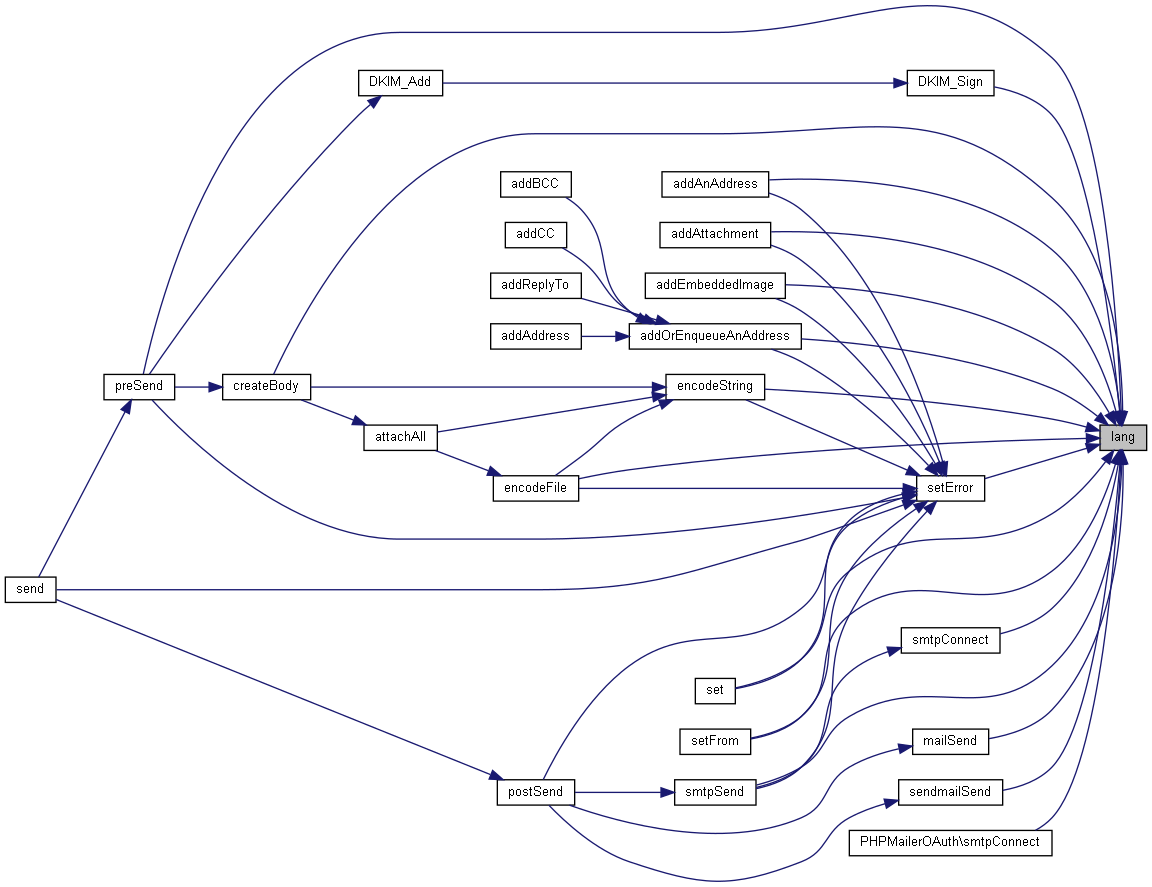
|
protected |
Send mail using the PHP mail() function.
| string | $header | The message headers |
| string | $body | The message body phpmailerException protected boolean |
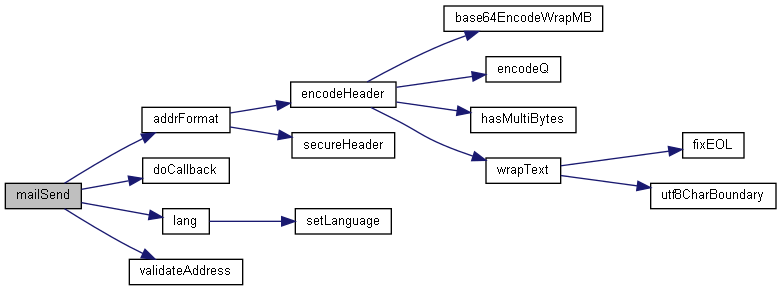

|
static |
Multi-byte-safe pathinfo replacement. Drop-in replacement for pathinfo(), but multibyte-safe, cross-platform-safe, old-version-safe. Works similarly to the one in PHP >= 5.2.0 string $path A filename or path, does not need to exist as a file integer|string $options Either a PATHINFO_* constant, or a string name to return only the specified piece, allows 'filename' to work on PHP < 5.2 string|array
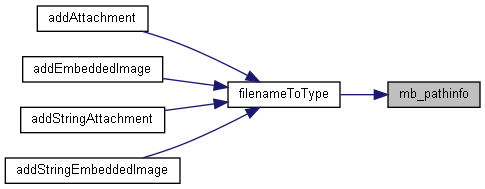
| msgHTML | ( | $message, | |
$basedir = '', |
|||
$advanced = false |
|||
| ) |
Create a message body from an HTML string. Automatically inlines images and creates a plain-text version by converting the HTML, overwriting any existing values in Body and AltBody. Do not source $message content from user input! $basedir is prepended when handling relative URLs, e.g.  and must not be empty will look for an image file in $basedir/images/a.png and convert it to inline. If you don't provide a $basedir, relative paths will be left untouched (and thus probably break in email) If you don't want to apply these transformations to your HTML, just set Body and AltBody directly. @access public
and must not be empty will look for an image file in $basedir/images/a.png and convert it to inline. If you don't provide a $basedir, relative paths will be left untouched (and thus probably break in email) If you don't want to apply these transformations to your HTML, just set Body and AltBody directly. @access public
| string | $message | HTML message string |
| string | $basedir | Absolute path to a base directory to prepend to relative paths to images |
| boolean | callable | $advanced | Whether to use the internal HTML to text converter or your own custom converter |
|
static |
Normalize line breaks in a string. Converts UNIX LF, Mac CR and Windows CRLF line breaks into a single line break format. Defaults to CRLF (for message bodies) and preserves consecutive breaks.
| string | $text | |
| string | $breaktype | What kind of line break to use, defaults to CRLF |
| parseAddresses | ( | $addrstr, | |
$useimap = true |
|||
| ) |
Parse and validate a string containing one or more RFC822-style comma-separated email addresses of the form "display name <address>" into an array of name/address pairs. Uses the imap_rfc822_parse_adrlist function if the IMAP extension is available. Note that quotes in the name part are removed.
| string | $addrstr | The address list string |
| bool | $useimap | Whether to use the IMAP extension to parse the list |

| postSend | ( | ) |
Actually send a message. Send the email via the selected mechanism
| phpmailerException |
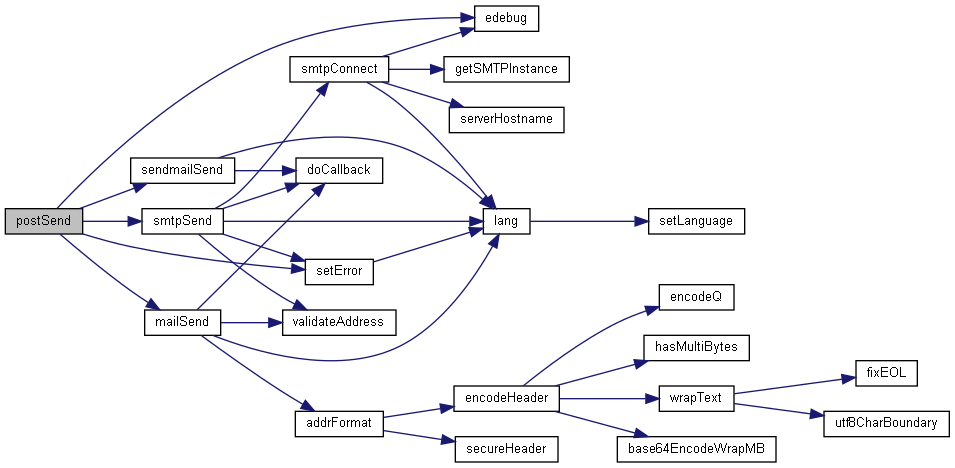

| preSend | ( | ) |
Prepare a message for sending.
| phpmailerException |
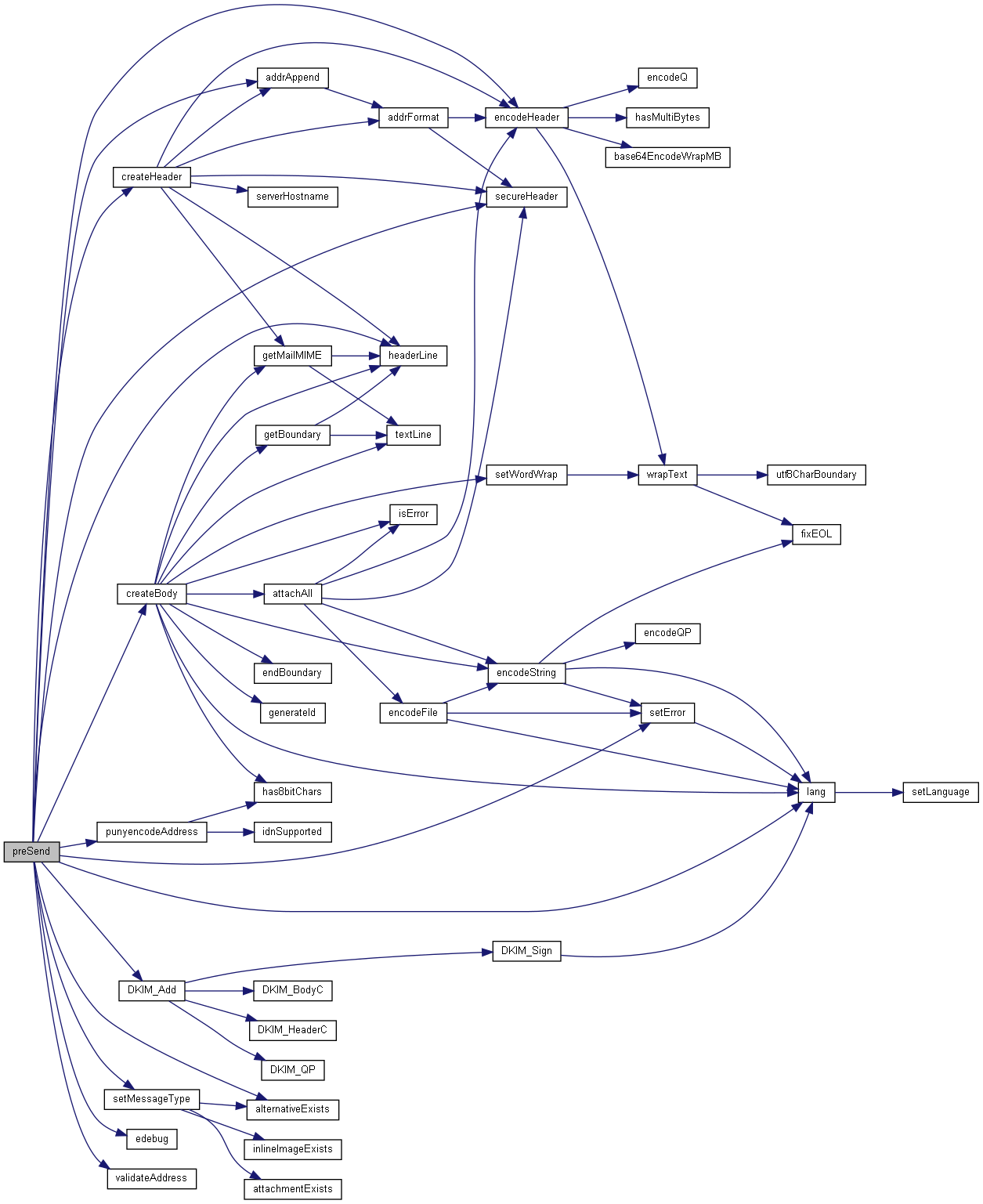

| punyencodeAddress | ( | $address | ) |
Converts IDN in given email address to its ASCII form, also known as punycode, if possible. Important: Address must be passed in same encoding as currently set in PHPMailer::$CharSet. This function silently returns unmodified address if:
| string | $address | The email address to convert |


|
static |
Return an RFC 822 formatted date. @access public
| secureHeader | ( | $str | ) |
Strip newlines to prevent header injection. @access public
| string | $str |
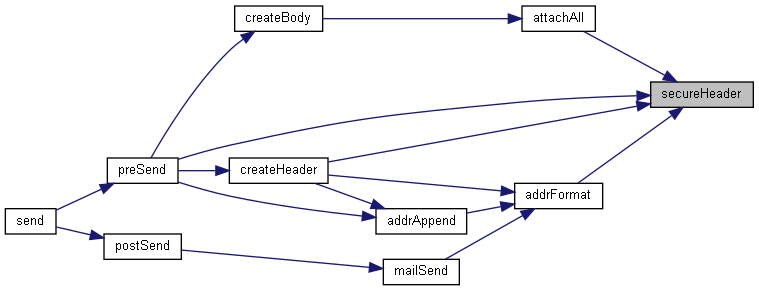
| send | ( | ) |
Create a message and send it. Uses the sending method specified by $Mailer.
| phpmailerException |
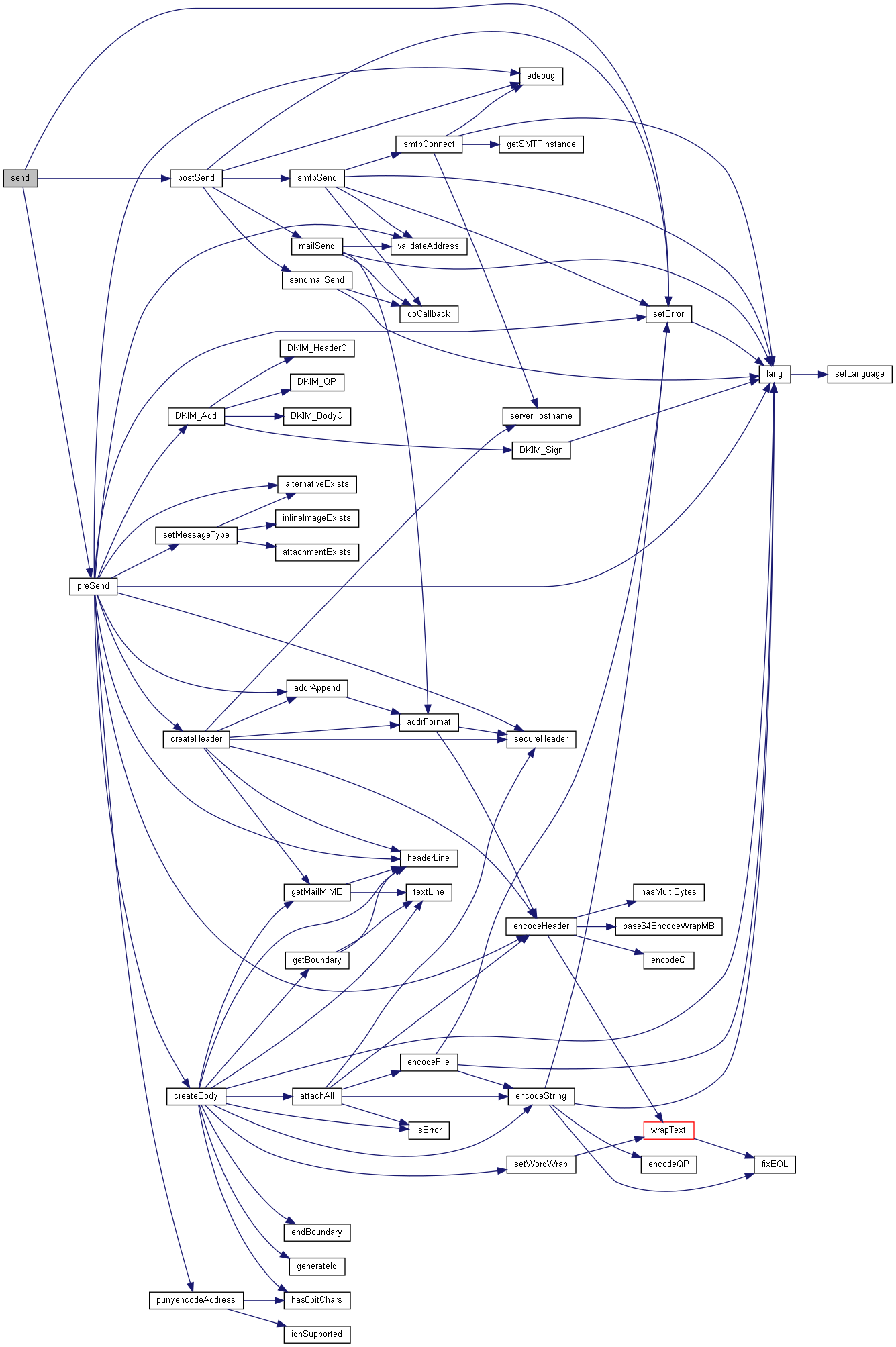
|
protected |
Send mail using the $Sendmail program.
| string | $header | The message headers |
| string | $body | The message body |
| phpmailerException | @access protected |


|
protected |
Get the server hostname. Returns 'localhost.localdomain' if unknown. @access protected

| set | ( | $name, | |
$value = '' |
|||
| ) |
Set or reset instance properties. You should avoid this function - it's more verbose, less efficient, more error-prone and harder to debug than setting properties directly. Usage Example: ‘$mail->set('SMTPSecure’, 'tls');` is the same as: ‘$mail->SMTPSecure = 'tls’;` @access public
| string | $name | The property name to set |
| mixed | $value | The value to set the property to |

|
protected |
Add an error message to the error container. @access protected
| string | $msg |

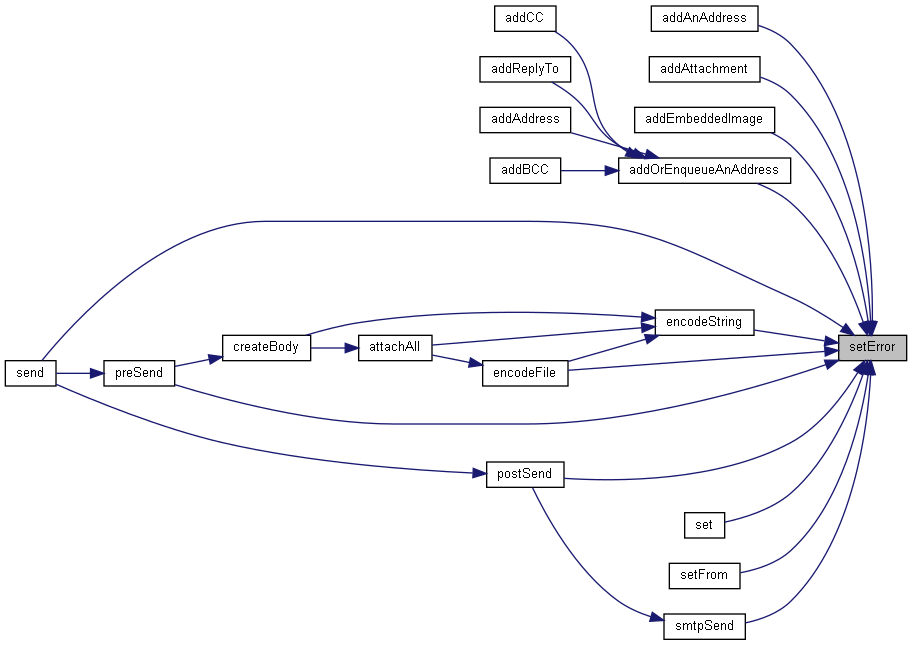
| setFrom | ( | $address, | |
$name = '', |
|||
$auto = true |
|||
| ) |
Set the From and FromName properties.
| string | $address | |
| string | $name | |
| boolean | $auto | Whether to also set the Sender address, defaults to true |
| phpmailerException |
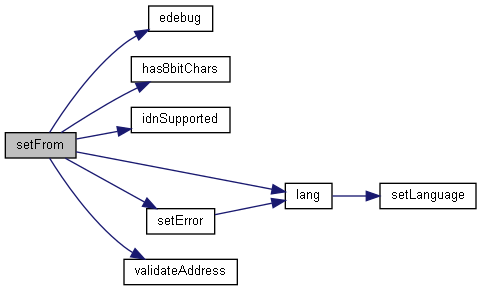
| setLanguage | ( | $langcode = 'en', |
|
$lang_path = '' |
|||
| ) |
Set the language for error messages. Returns false if it cannot load the language file. The default language is English.
| string | $langcode | ISO 639-1 2-character language code (e.g. French is "fr") |
| string | $lang_path | Path to the language file directory, with trailing separator (slash) |
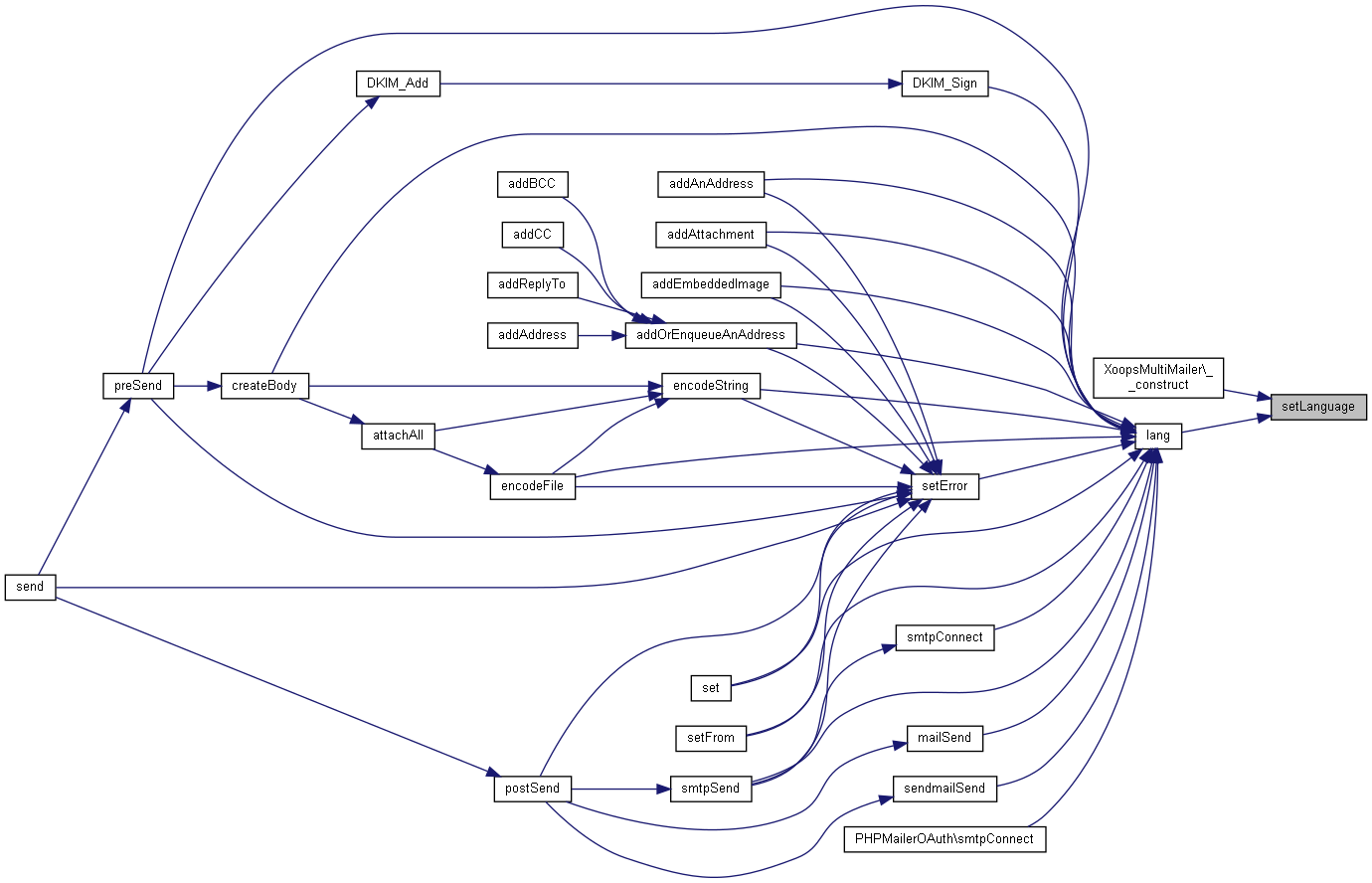
|
protected |
Set the message type. PHPMailer only supports some preset message types, not arbitrary MIME structures. @access protected
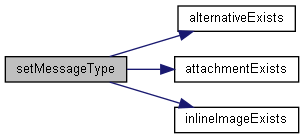

| setWordWrap | ( | ) |
Apply word wrapping to the message body. Wraps the message body to the number of chars set in the WordWrap property. You should only do this to plain-text bodies as wrapping HTML tags may break them. This is called automatically by createBody(), so you don't need to call it yourself. @access public


| sign | ( | $cert_filename, | |
| $key_filename, | |||
| $key_pass, | |||
$extracerts_filename = '' |
|||
| ) |
Set the public and private key files and password for S/MIME signing. @access public
| string | $cert_filename | |
| string | $key_filename | |
| string | $key_pass | Password for private key |
| string | $extracerts_filename | Optional path to chain certificate |
| smtpClose | ( | ) |
Close the active SMTP session if one exists.

| smtpConnect | ( | $options = null | ) |
Initiate a connection to an SMTP server. Returns false if the operation failed.
| array | $options | An array of options compatible with stream_context_create() @uses SMTP @access public |
| phpmailerException |
Reimplemented in PHPMailerOAuth.
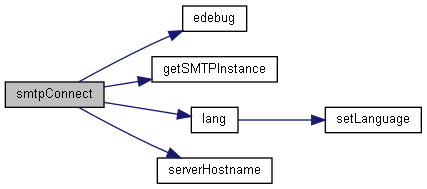

|
protected |
Send mail via SMTP. Returns false if there is a bad MAIL FROM, RCPT, or DATA input. Uses the PHPMailerSMTP class by default.
| string | $header | The message headers |
| string | $body | The message body |
| phpmailerException | @uses SMTP @access protected |
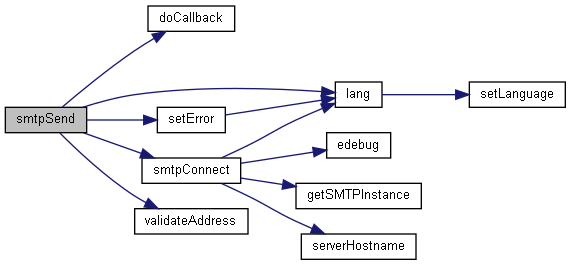

| textLine | ( | $value | ) |
Return a formatted mail line. @access public
| string | $value |

| utf8CharBoundary | ( | $encodedText, | |
| $maxLength | |||
| ) |
Find the last character boundary prior to $maxLength in a utf-8 quoted-printable encoded string. Original written by Colin Brown. @access public
| string | $encodedText | utf-8 QP text |
| integer | $maxLength | Find the last character boundary prior to this length |

|
static |
Check that a string looks like an email address.
| string | $address | The email address to check |
| string | callable | $patternselect | A selector for the validation pattern to use :
|
@access public
Uses the same RFC5322 regex on which FILTER_VALIDATE_EMAIL is based, but allows dotless domains. 2009-2010 Michael Rushton Feel free to use and redistribute this code. But please keep this copyright notice. This is the pattern used in the HTML5 spec for validation of 'email' type form input elements. http://www.whatwg.org/specs/web-apps/current-work/#e-mail-state-(type=email)
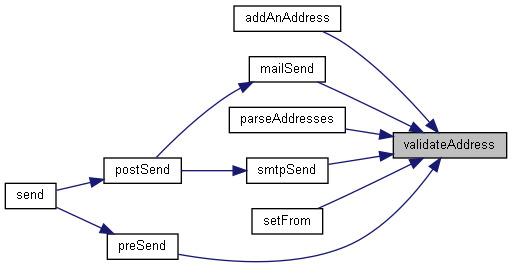
| wrapText | ( | $message, | |
| $length, | |||
$qp_mode = false |
|||
| ) |
Word-wrap message. For use with mailers that do not automatically perform wrapping and for quoted-printable encoded messages. Original written by philippe.
| string | $message | The message to wrap |
| integer | $length | The line length to wrap to |
| boolean | $qp_mode | Whether to run in Quoted-Printable mode @access public |

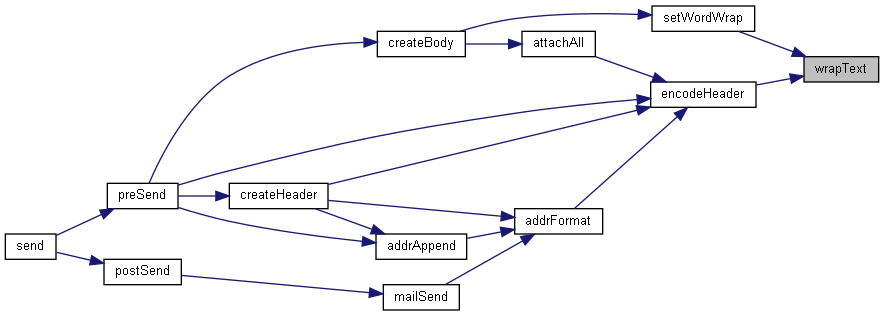
| $action_function = '' |
|
protected |
| $AllowEmpty = false |
| $AltBody = '' |
|
protected |
| $AuthType = '' |
|
protected |
| $Body = '' |
|
protected |
|
protected |
| $CharSet = 'iso-8859-1' |
| $ConfirmReadingTo = '' |
| $ContentType = 'text/plain' |
|
protected |
| $Debugoutput = 'echo' |
| $DKIM_domain = '' |
| $DKIM_identity = '' |
| $DKIM_passphrase = '' |
| $DKIM_private = '' |
| $DKIM_private_string = '' |
| $DKIM_selector = '' |
| $do_verp = false |
| $Encoding = '8bit' |
|
protected |
| $ErrorInfo = '' |
|
protected |
| $From = 'root@localhost' |
| $FromName = 'Root User' |
| $Helo = '' |
| $Host = 'localhost' |
| $Hostname = '' |
| $Ical = '' |
|
protected |
|
protected |
| $LE = "\n" |
| $Mailer = 'mail' |
|
protected |
|
protected |
| $MessageDate = '' |
| $MessageID = '' |
|
protected |
|
protected |
| $Password = '' |
| $PluginDir = '' |
| $Port = 25 |
| $Priority = null |
| $Realm = '' |
|
protected |
|
protected |
|
protected |
| $ReturnPath = '' |
| $Sender = '' |
| $Sendmail = '/usr/sbin/sendmail' |
|
protected |
|
protected |
|
protected |
|
protected |
| $SingleTo = false |
| $SingleToArray = array() |
|
protected |
| $SMTPAuth = false |
| $SMTPAutoTLS = true |
| $SMTPDebug = 0 |
| $SMTPKeepAlive = false |
| $SMTPOptions = array() |
| $SMTPSecure = '' |
| $Subject = '' |
| $Timeout = 300 |
|
protected |
|
protected |
| $Username = '' |
| $UseSendmailOptions = true |
|
static |
| $Version = '5.2.28' |
| $WordWrap = 0 |
| $Workstation = '' |
| $XMailer = '' |
| const CRLF = "\r\n" |
SMTP RFC standard line ending.
| const MAX_LINE_LENGTH = 998 |
| const STOP_CONTINUE = 1 |
Error severity: message, likely ok to continue processing.
| const STOP_CRITICAL = 2 |
Error severity: message, plus full stop, critical error reached.
| const STOP_MESSAGE = 0 |
Error severity: message only, continue processing.